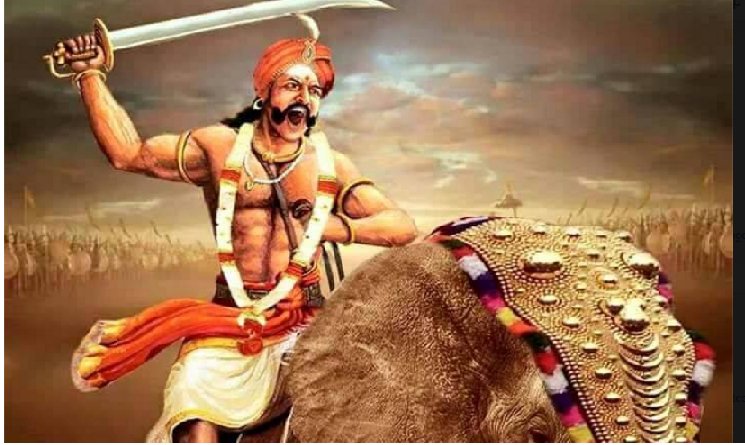A couple of years back, I was fortunate to pay a visit to Arulmigu Sankaranarayana Swami Temple, in Sankarankoil, in Tenkasi District Tamilnadu. We were a group and I being the only nonnative, everyone else was busy explaining the history, architecture and other details of the place. After the darshan in the Gomathi ambal temple, we came across a room which was named ‘Puli Thevar Arai’, where Puli Thevar turned into a ‘Jyothi’ or light. The sparkles in their eyes and vigour in their voice conveyed that they were talking about someone close to their heart. Years down the line, today on the occasion of Azadi ka Amrit Mahotsav and 306th Birth Anniversary of Puli Thevar, I feel ashamed of myself for being so ignorant then, of the history of resistance of my countrymen against the East India Company.
Puli Thevar resisted the lethal combination of the Mughals and the East India Company for more than a decade from conquering the South of India. He was the ruler of Nerkattumseval, one of the seventy-two palayams in the region. After the fall of Madurai Nayak dynasty, the Palayams were functioning as independent entities. Puli Thevar refused to pay taxes either in the form of money or products (food grains) to the Nawab of Arcot who was then in an alliance with the East India Company.
The period between 1750 to 1760, saw several fierce battles in and around Sankarankovil and Tirunelveli. When our history books are vociferous about the Battle of Plassey, there remains a disturbing silence on the victories of rulers from the south who emerged victorious against Robert Clive and Warren Hastings, who earned enormous personal fortunes by looting our country. The battlefields of Kalakad, Srivilliputhur, Nerkattumseval and Tirunelveli saw the defeat of the Company and the Nawabs. Puli Thevar with his brilliant statesmanship was able to bring the rulers of Palayam as well as Anizham Thirunal Marthanda Varma, the king of Thiruvithamkoor, together in the fight against the Parankees (the local slang referring to the British). Marthanda Varma who defeated the Dutch East India Company in the Colachel war, sent his army to assist the Palayakarars in the Battle of Kalakad. On the other hand, Puli Thevar was quick enough to reject the help from the Dutch and the French.
For a short stint, he lost to the army of Yusuf Khan armed with special cannons brought from England. Yet he regained the fort within a couple of months. The last war fought by Puli Thevar was in 1767. Several lives were lost. Most of the official records say that he escaped into the woods of the Western Ghats.
But the room near the Gomathi Ambal has another story to tell. Puli Thevar was made a captive by the men of the East India Company. As per his last wish, he was allowed to pray in the Jeeva Samadhi of his Guru, Velappa Desiyar, from where he got the instruction to visit Gomathi Ambal Temple. It is said that he disappeared after entering the room which is now named after him. The room now adorns a beautiful portrait of the brave son of the soil.
The Chinthu Padalgal, a variety of folk songs sung during the travels, has recorded the life and achievements of Puli Thevar. Born to Chithiraputhira Thevar and Sivanjana Nachiyar, he was a child prodigy. He was a handsome tall young man with an enchanting face, sparkling eyes and broad shoulders. He was brilliant in both martial arts and literature, he could use all weapons with ease and also wrote poetry. Even though he ruled amid turbulence, he was never distracted from his duty towards his fellow men. A number of temples in and around Tirunelveli and Tenkasi districts were patronized by him. The copper plates record that, ponds have been dug by him.
Even though his disappearance led to the end of the first Polygar war, the holy mission of protecting our motherland was carried on by the Palayakarars till the first decade of the next century through the second Polygar war. We will be doing injustice to our ancestors if we address them as freedom fighters. Because during their lifetime, they kept the British East India Company at bay from their motherland. They never lost their freedom to the company and lived a glorious life.



















Discussion about this post